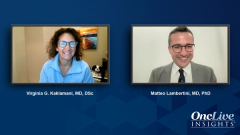
Timing Fertility Preservation in Patients With Breast Cancer Undergoing Surgery
Expert oncologists Matteo Lambertini, MD, PhD, and Virginia Kaklamani, MD, DSc, review fertility preservation strategies in the context of patients with breast cancer undergoing surgery.
Episodes in this series

Transcript:
Virginia G. Kaklamani, MD, DSc: One of the questions that always comes in, usually from patients, is [about] the timing. You have a woman; you see her preoperatively. She just [received a diagnosis of] ER-positive breast cancer. She’s going to have surgery or triple negative [breast cancer treatment], and she’s going to have neoadjuvant chemotherapy, but there it’s a little more clear. Do you tend to do the oocyte cryopreservation or embryo cryopreservation prior to surgery or after surgery if a woman is going to receive chemotherapy after surgery?
Matteo Lambertini, MD, PhD:For those women receiving chemotherapy in the adjuvant setting, I usually do it after surgery. For those women who are candidates [for] neoadjuvant chemotherapy, I refer them to oocyte cryopreservation. Embryo cryopreservation is not allowed by law in my country [Italy]. So I use oocyte cryopreservation in this setting. There [is] some concern, particularly in some countries also in Europe, on the use of this strategy before neoadjuvant chemotherapy. We have [limited] safety data, but we have safety data to say that neoadjuvant chemotherapy is not a contraindication for oocyte or embryo cryopreservation. So this 2 [to] 3 weeks’ time that we need for this procedure is usually the time we need to initiate a neoadjuvant treatment. So there is no major delay. There is a recent meta-analysis in human reproduction by colleagues showing that there is less than 1 week delay between those initiating chemotherapy, between those women who receive fertility preservation before starting chemotherapy or who received chemotherapy alone. It’s not a major burden for most of the patients with breast cancer that we see in our practice.
Virginia G. Kaklamani, MD, DSc: As you mentioned before, fertility colleagues have become so good at giving short courses of estrogen stimulation for those women that it really doesn’t become an issue. That’s another concern that some of our patients [with] ER [estrogen receptor]-positive [disease] are going to have: “You’re giving me high doses of estrogen when my tumor, you just told me, feeds off my body’s estrogen. So how does that work?” And at least the data we have available don’t suggest that those women will have a higher risk of recurrence. So it seems to be safe to give that high dose but [a] very short course of estrogen therapy.
Matteo Lambertini, MD, PhD:Exactly. The data we have [are] mostly retrospective, but several studies have looked into this aspect, and [we] have seen that these strategies are giving hormones for a short duration before chemotherapy. So the time of diagnosis is safe. There is no increased risk of these recurrences. It is safe for those women with hormone receptor–positive disease and those patients receiving neoadjuvant treatment. So this procedure will not harm the patient. This mean[s] that what we have to do is create a strong nectar [and] not lose time in this setting so that we can refer the patient as soon as possible…to [a] fertility specialist for…the procedure. [That] is the main issue here.
Transcript edited for clarity.




































